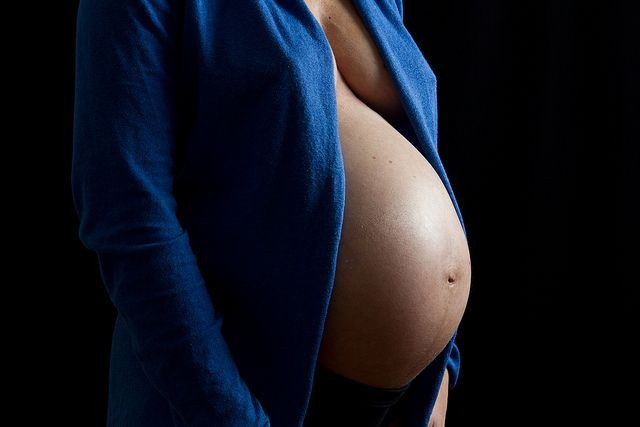Pregnancy Weight Gain Linked To Autism In Kids; Should Women Change Their Diets While Pregnant?

Researchers have found that the recent rise of autism spectrum disorder (ASD) in the U.S. coincides with the increase in body mass index (BMI) among pregnant mothers. According to a recent study, processes like abnormal hormone levels or inflammation underlying both excessive pregnancy weight gain and ASD in kids could point to a link between the two conditions.
Pregnancy weight gain is inevitable for expecting mothers as eating for two becomes the dietary norm for nine months. The appropriate weight to gain during a pregnancy is contingent upon various factors including the mother’s pre-pregnancy weight and BMI, and the mother's and baby’s health. Typically, women gain anywhere from 3 to 4 lbs. a month until they are in labor, according to the Mayo Clinic. Women who gain an excessive amount of weight while pregnant can increase their risk of developing hypertension and diabetes, which not only makes the pregnancy more difficult to manage, but also creates detrimental health risks for the baby.
In the new study, researchers sought to examine if pregnancy weight gain is correlated with an increased risk of autism in children. The University of Utah researchers used data from the Utah Department of Health’s Registry of Autism and Developmental Disabilities to conduct two separate study groups by comparing the cases of 8-year-olds with ASD to those without ASD in Salt Lake and Davis county.
In the first group, 128 children diagnosed with ASD were compared to a control group of 10,920 children of the same age and gender. The second sample group included 288 Utah children diagnosed with ASD who were compared to their unaffected siblings, which provided a unique model for researchers to examine the link between mothers' pregnancy weight gain and ASD.
In both study groups, pregnancy weight patterns were identified as common factors in mothers who gave birth to children born with the disorder. The average weight of women who had children with autism was roughly 34 lbs. compared to 31 lbs. among mothers of children without ASD, wrote the researchers. The increased risk for an ASD diagnosis in the first group was 10 percent. When comparing ASD children to their siblings, the researchers found for every 5 lbs. the mother gained during pregnancy, there was a 17 percent increased risk for the child's ASD diagnosis. There were no links found between autism risk and a woman’s pre-pregnancy weight.
“The risk of autism spectrum disorder associated with a modest yet consistent increase in pregnancy weight gain suggests that pregnancy weight gain may serve as an important marker for autism's underlying gestational etiology," said Deborah A. Bilder, M.D., lead author of the study and an assistant professor of psychiatry at the University of Utah, Medical Xpress reports.
Added weight or an increase in body fat changes hormone levels, causes inflammation, and elevates blood sugar levels, all of which may have an impact on the fetal environment, says the National Institutes of Health. These maternal conditions can potentially reach the fetus and cause damage to the developing brain, increasing the risk of developmental disabilities.
While the findings of the study suggest an important link between pregnancy weight gain and autism, researchers do not advise women to change their pregnancy diets solely based on this study.
"Doctors have known for a long time that proper nutrition is essential to a healthy pregnancy. Pregnant women should not change their diet based on these results. Rather, this study provides one more piece for the autism puzzle that researchers are exploring,” Bilder said.
In a similar study, researchers from the University of California Davis MIND Institute looked at the medical records of mothers with children with ASD to examine the association between obesity and autism. Women who were obese during pregnancy were approximately 67 percent more likely than normal-weight woman to have autistic children. Obese moms were also found to face double the risk of having children with other developmental delays.
According to the Centers for Disease Control and Prevention, one in 110 children has autism. Developmental disabilities in autism include major social, communication, and behavioral challenges with symptoms typically present before the age of 3.
To learn more about autism, visit autism-society.org.



























